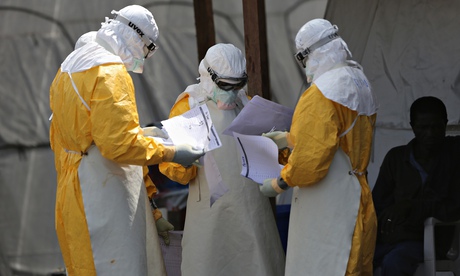
The World Bank is to invest $100m (£63m) in an attempt to increase the number of foreign health workers heading for west Africa to care for people with Ebola.
Treatment centres in the three countries at the heart of the epidemic – Liberia, Sierra Leone and Guinea – are being built but the biggest need is for doctors, nurses and other healthcare workers to staff them. The United Nations says around 5,000 international personnel are needed, including up to 1,000 foreign health workers.
In the UK, 900 people have volunteered to go to Africa, none of whom have left yet, while the African Union has pledged 2,000 people. More numbers are needed and progress in getting volunteers to affected areas has been slow.
“The world’s response to the Ebola crisis has increased significantly in recent weeks, but we still have a huge gap in getting enough trained health workers to the areas with the highest infection rates,” said World Bank Group president, Jim Yong Kim.
“We must urgently find ways to break any barriers to the deployment of more health workers. It is our hope that this $100m can help be a catalyst for a rapid surge of health workers to the communities in dire need.”
Pay and benefits, recruitment and training have all been issues, says the Bank. Potential volunteers are also worried about their safety – health workers are at the highest risk of contracting the disease because of their physical contact with sick patients. There have been major scares in the United States and in Spain where health workers have been infected even though they should have been well-equipped and trained in the strict safety procedures.
Health workers from Europe and north America also want to be sure they will be repatriated in the event of becoming ill, believing their chances of survival to be greater at home, where health systems are more sophisticated because they are better funded. The UK is building a treatment centre specifically for health workers who become infected in Sierra Leone, where standards are intended to be as high as they would be in the NHS. Other concerns include transportation and housing, says the Bank.
The new funds, which take the World Bank’s total Ebola contribution so far to $500m, will help set up a coordination hub with the three countries’ governments, the World Health Organiation, the UN’s main Ebola coordination centre in Ghana and other agencies. The hub will actively recruit, train and deploy qualified health workers.
“Health workers take an oath to treat the sick – and so it’s no surprise to me that many health workers want to go treat Ebola patients at the source of this epidemic,” said Kim, an infectious disease doctor who spent years treating patients in poor countries. “So we need to find all ways possible to remove any obstacle that stops health workers from serving – whether it is pay for workers in developing countries, or the promise of evacuation services. Health workers who treat Ebola patients are heroes, and we should treat them as such.”
